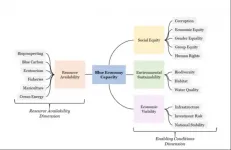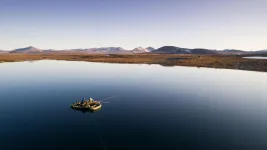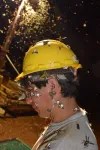(Press-News.org) The future of an equitable and sustainable global ocean, or "Blue Economy," depends on more than the resources available for technological advancement and industry expansion. A recent UBC-led study found that socioeconomic and governance conditions such as national stability, corruption and human rights greatly affect the ability to achieve a Blue Economy.
The study, published today in Nature, scored criteria across five global regions: Africa, Americas, Asia, Europe and Oceania, to identify the areas of investment and research necessary to develop ocean resources in a manner that is consistent with a Blue Economy ethos (socially equitable, environmentally sustainable and economically viable). These included: infrastructure, investment, economic and group equity, gender equality, human rights, biodiversity, habitat, water quality, corruption, and national stability.
"We found that there are considerable differences between regions, where some are focused primarily on resources, whereas others are really trying to make sure that development is meeting local social and cultural objectives," said lead author Andrés Cisneros-Montemayor, research associate for the Institute for the Oceans and Fisheries at the University of British Columbia and deputy director of the Nippon Foundation Ocean Nexus Center. "For all countries, including Canada, the most important question we need to be asking is, how are we going to make sure that we develop those resources in ways that actually benefit local communities? Otherwise we're back to business-as-usual, where only a few benefit from ocean resources. This is what the Blue Economy is trying to change."
As natural resources are widely but unevenly distributed across the oceans, many areas will be unable to competitively develop multiple sectors. It is, therefore, important to choose and manage sectors carefully, as development for sectors like ecotourism, fishing, mariculture, or others, can be important at local scales but may not be ecologically sustainable or socially desirable at larger scales. Ocean-based development plans for Asia and Europe, for example, do prioritize mariculture and tourism, but also sectors such as shipping, port construction, and large-scale ocean energy projects which have potential for economic growth, but unclear benefits for local communities. Oceania, on the other hand, has prioritized community objectives, traditional resource uses, and emerging sectors that can be developed in accordance with local goals. In other words, more focus on developing and transforming their ocean economies to advance equity and sustainability.
"Canada is in a great position to be a leader on this, with coastlines on three oceans and a lot of local knowledge and capacity to develop sectors carefully," said Cisneros-Montemayor. "It is currently in the process of developing it Blue Economy plan, yet, we are now seeing that the draft, which at the time our study was just being prepared, is very much focused on new technologies. Yet, as a nation, Canada has very publicly focused on equity, inclusion and deeper issues such as Indigenous reconciliation. We have to make sure that those national priorities are fully part of Canada's Blue Economy strategy and create an example that others can learn from. And yet these priorities are not currently reflected in its Blue Economy draft. What is happening in the oceans is not fundamentally different than the issues happening at a national level."
"History has taught us that having rich natural resources does not necessarily support sustainable development, and this applies to ocean economies as well" said William Cheung, co-author on the paper, professor in the Institute for the Oceans and Fisheries and Canada Research Chair in Ocean Sustainability and Global Change). "Global and local investment in the blue economy needs to prioritize in enhancing knowledge and their accessibility, developing appropriate and effective governance, improving social equity and reducing risks to the ocean such as from biodiversity loss and climate change."
INFORMATION:
"Enabling conditions for an equitable and sustainable blue economy" was published today in Nature.
To observe how a tiny ball of identical cells on its way to becoming a mammalian embryo first attaches to an awaiting uterine wall and then develops into nervous system, heart, stomach and limbs: This has been a highly-sought grail in the field of embryonic development for nearly 100 years. Prof. Jacob Hanna of the Weizmann Institute of Science and his group have now accomplished this feat. The method they created for growing mouse embryos outside the womb during the initial stages after embryo implantation will give researchers an unprecedented tool for understanding the development program encoded in the genes, and it may provide detailed insight into birth and developmental defects as well as those involved ...
Forces acting inside the Earth have been constantly reshaping the continents and ocean basins over millions of years. What Alfred Wegener published as an idea in 1915 has finally been accepted since the 1960s, providing a unifying view about our planet. The fact that the theory of plate tectonics took so long to gain acceptance had two simple reasons. First, the geological formations that are most important for its understanding lie at the bottom of the oceans. Secondly, forces controlling the processes act below the seafloor and are hence hidden from our view. Many details of plate tectonics are therefore still unclear today.
Today, ...
Tucson, Ariz. (March 16, 2021) - This week, a new, peer-reviewed scientific study finds that there is far more potential jaguar habitat in the U.S. than was previously thought. Scientists identified an area of more than 20 million acres that could support jaguars in the U.S., 27 times the size of designated critical habitat.
The results, published in the journal Oryx, are based on a review of 12 habitat models for jaguars within Arizona and New Mexico, conclusively identifying areas suitable for the recovery of these wild cats. Based on the expanded habitat area, the authors conclude that findings uncover new opportunities for jaguar conservation in North America that ...
Researchers have channeled the universe's earliest light - a relic of the universe's formation known as the cosmic microwave background (CMB) - to solve a missing-matter mystery and learn new things about galaxy formation. Their work could also help us to better understand dark energy and test Einstein's theory of general relativity by providing new details about the rate at which galaxies are moving toward us or away from us.
Invisible dark matter and dark energy account for about 95% of the universe's total mass and energy, and the majority of the 5% that is considered ordinary matter is also largely unseen, such as the gases at the outskirts of galaxies that comprise their so-called halos.
Most ...
Imagine not a white, but a green Arctic, with woody shrubs as far north as the Canadian coast of the Arctic Ocean. This is what the northernmost region of North America looked like about 125,000 years ago, during the last interglacial period, finds new research from the University of Colorado Boulder.
Researchers analyzed plant DNA more than 100,000 years old retrieved from lake sediment in the Arctic (the oldest DNA in lake sediment analyzed in a publication to date) and found evidence of a shrub native to northern Canadian ecosystems 250 miles (400 km) farther north than its current range.
As the Arctic warms much ...
An estimated 14,480 new cases of invasive cervical cancer will be diagnosed in the United States this year, according to the American Cancer Society. Cases that could be prevented or cured with better education from screening to treatment based on improved provider-patient communication, says a Michigan State University researcher.
The issue is particularly acute for Black women, said Sabrina Ford, an associate professor in the Department of Obstetrics, Gynecology and Reproductive Biology within MSU's College of Human Medicine. Ford's research was published ...
Artificial light at night (ALAN) is a major factor in global insect decline. In a paper published today in Insect Conservation and Diversity, Smithsonian Conservation Biology Institute (SCBI) scientists and partners found that using amber-colored filters to remove the blue spectra of light from "warm white" LED (light-emitting diode) lamps drastically reduces insect attraction to nocturnal lighting in a tropical forest. This is the first study to validate quantitative predictions of how lamp color affects insect attraction and provide clear recommendations to mitigate the negative impacts of ALAN on wildlife in rainforest ecosystems.
"While ...
Many bacteria swim towards nutrients by rotating the helix-shaped flagella attached to their bodies. As they move, the cells can either 'run' in a straight line, or 'tumble' by varying the rotational directions of their flagella, causing their paths to randomly change course. Through a process named 'chemotaxis,' bacteria can decrease their rate of tumbling at higher concentrations of nutrients, while maintaining their swimming speeds. In more hospitable environments like the gut, this helps them to seek out nutrients more easily. However, in more nutrient-sparse ...
A new study involving UCLA researchers finds that mobile stroke units (MSUs) - state-of-the-art ambulances built to provide stroke patients with emergency neurological diagnosis and treatment prior to hospital arrival -- improve patient outcomes and lessen the chance for disability by delivering care faster than standard stroke care.
The UCLA Mobile Stroke Unit serves as a shared regional resource of LA County EMS Provider Agencies, taking patients to 15 different stroke center hospitals within 3 regions in Los Angeles County. The MSU carries a CT scanner that can directly image the brain and blood vessels in the field. UCLA was one of seven national mobile stroke unit programs to participate in the clinical trial, which was presented March 17 at the ...
Water is an ephemeral thing. It can emerge from an isolated spring, as if by magic, to birth a babbling brook. It can also course through a mighty river, seeping into the soil until all that remains downstream is a shady arroyo, the nearby trees offering the only hint of where the water has gone.
The interplay between surface water and groundwater is often overlooked by those who use this vital resource due to the difficulty of studying it. Assistant professors Scott Jasechko and Debra Perrone, of UC Santa Barbara, and their colleagues leveraged their enormous ...





